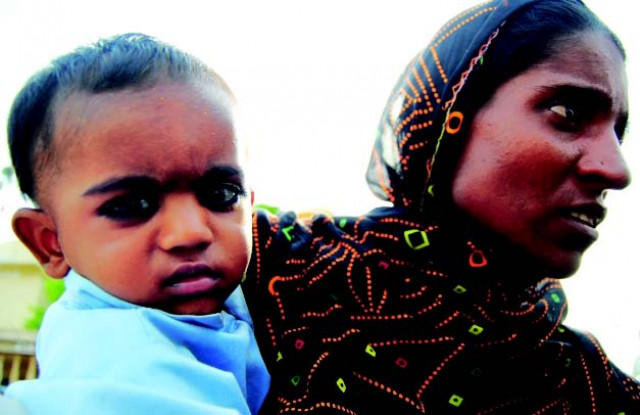Beggars can be choosers
Beggars have figured out a new way to extract money from the city’s philanthropists.

When a CDGK official came across a child at a relief camp who was asking for money, he was struck by the inconsistency of the situation. “How would a flood survivor, who has never begged before, know how to beg and whom to ask for money?” he said, adding that: “I immediately asked the child’s mother who she was. She told me she was a flood victim whose ID card had been burnt.”
When the government official asked her how she had come about a fire in a flood, she looked uncomfortable. “Her burnt card showed that she was a beggar from Malir who was just cashing in on the opportunity,” the official said.
Ramazan is the real jackpot for beggars around the city, allowing them to multiply their income ten-fold. It is believed that the number of beggars multiplies because of the local mafia, which calls in people from other parts of the country to be able to pocket the maximum amount of Zakat.
According to the City District Government Karachi (CDGK), the people of Karachi donate Rs50 million in the month of Ramazan as charity, said former city chief warden Azhar Hashmi.
Normally, around 1,000 to 1,500 beggars work the streets across the city, said city chief warden Tehseenur Rehman, who added that the numbers had risen to 4,000 last Ramazan. They had to be sent to the Edhi village outside Thatta, he said.
This year, the increase in number was inconsistently low, compared with the previous years. “This is because most beggars have made their way to the relief camps with fake identities and there is no way to tell them apart from the flood survivors,” the CDGK official said.
However, Iqbal, who asks for money by showing off his swollen hand, seemed concerned about the presence of IDPs in Karachi. “Wo apnay ilaqay mein ja kar mangay na. Idhar ka hum letay hein,” said Iqbal, who lives with his ‘seth’ in Machar Colony.
Flood survivors in Karachi have also felt this resentment.
A family of flood survivors said that they were sitting close to the Alamgir Welfare to ask passers-by for some food when they were shooed off by the local beggars, who claimed it was their area.
“We were sitting on God’s land. We were not even begging, just asking for help and they still told us to go away,” said Rehana, who had arrived to Karachi from Muzaffargarh around eight days ago.
Beggary is expected to rise by 200 per cent in the city, said Initiator Development Foundation president Rana Asif, who added that a large number of opportunists are likely to take advantage of this situation and exploit flood survivors.
Families are already collecting rations from different welfare organisations and selling them to the local general stores, said Asif, who added that, “A sack of flour, which actually costs Rs300, is being re-sold for Rs100 and an oil can worth Rs400 is being passed on for Rs200.”
Some colonies also provide accommodations to the people coming in from southern Punjab and interior Sindh. “There are 350 houses in Chanesar Goth, 350 beds near the Cantt area and other accommodations at Nayi Abadi, near the Korangi Crossing,” Asif said.
Asking for food at the Abdullah Shah Ghazi’s shrine, Nadia - a flood survivor who is living in a rented house in Paposh Nagar is paying Rs4,000 a month with Rs10,000 as advance - said that the she knew that the house owner was charging her a lot. She added, however, that she had no choice.
Published in The Express Tribune, August 24th, 2010.












1724319076-0/Untitled-design-(5)1724319076-0-208x130.webp)






COMMENTS
Comments are moderated and generally will be posted if they are on-topic and not abusive.
For more information, please see our Comments FAQ